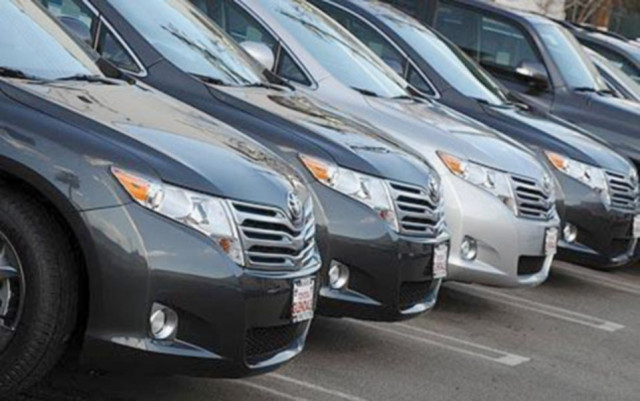Phenomenal growth: Auto industry’s profits up 52%
Rupee appreciation helped industry’s profitability.

The phenomenal growth in profitability is attributed to the increase in sale prices by 3% and an increase in sales volume by 2.3% YoY. PHOTO: FILE
The net profit for the auto sector has jumped by a massive 52% year-on-year (YoY) to Rs2 billion during the January-March 2014 period compared to Rs1.3 billion in the same period last year.
The phenomenal growth in profitability is attributed to the increase in sale prices by 3% and an increase in sales volume by 2.3% YoY.
The appreciation of rupee against the dollar and Japanese yen reduced the cost of the sector, which imports 50-60% of auto parts from Japan and Thailand. As a result, the gross margins improved by 230 basis points (bps) to 8% during January to March 2014 compared to the same period last year.
Since the age-limit of imported used cars was reduced from five years to three in December 2012, the local auto industry is performing well, in terms of sales volume and profitability but the growth is not as it was expected a year and a half ago.
The decision to increase import restrictions taken by the previous government dented the sales of imported cars as their sales declined by a massive 62% in the first half (Jul-Dec 2013) of fiscal year 2014 (FY14). However, contrary to expectations, sales of locally produced cars increased by a meagre 6.5% in the same period.
Now that FY14 has only two months remaining, the local industry is expected to register an overall growth of just 3-4% -- half of what analysts forecast at the end of first half of FY14. This has happened when the profitability of the sector is on a continuous rise in the last few months due to the appreciation of the rupee against the dollar and yen.
In the remaining two months (May and June) of fiscal year 2014, car sales are expected to remain sluggish, that is the country may see a cumulative increase of just 3-4%, JS Global Capital analyst Atif Zafar told The Express Tribune.
The sales of Pak Suzuki – largest carmaker in the country – will increase due to its recently-launched 1,000cc engine Wagon R but at the same time the sales of Indus Motor – country’s second largest car maker – are expected to decline as its customers are waiting for the new Corolla model.
“There is market talk that the government is going to reduce import duty on both car imports and car parts in the upcoming budget. This is why many customers are holding back their money,” he added.
Though all three car assemblers in the country reported growth, Honda Atlas Cars – the smallest of them all with just 17% market share – turned out to be the top assembler posting a strong increase in profitability of 170% YoY to Rs632 million. The increase in sale volumes and the exchange gains were the major factors behind the big growth of the company, InvestCap Research commented in a report on Friday.
Indus Motor and Pak Suzuki registered a growth of 29% YoY and 22% YoY respectively, during the first quarter.
It was FY12 that jolted the local car industry in which car imports jumped by a record 165% to over 55,703 units, up from just over 21,000 in FY11. However, the year 2012 was a good one for both, as local car assemblers saw their sales rise 23% . But in FY13, the sales for both imported and local cars declined sharply by 18.5% and 22% respectively.
Published in The Express Tribune, May 17th, 2014.
Like Business on Facebook, follow @TribuneBiz on Twitter to stay informed and join in the conversation.


















COMMENTS
Comments are moderated and generally will be posted if they are on-topic and not abusive.
For more information, please see our Comments FAQ